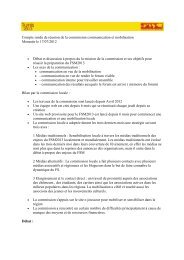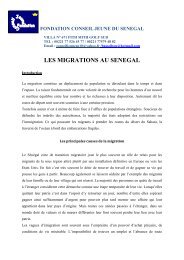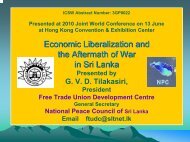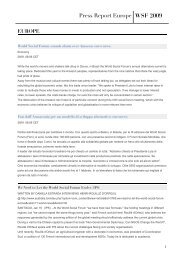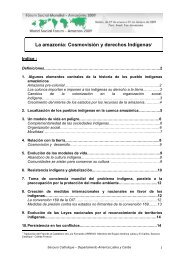TERMO DE REFERÊNCIA CONSTRUÍDO - OpenFSM!
TERMO DE REFERÊNCIA CONSTRUÍDO - OpenFSM!
TERMO DE REFERÊNCIA CONSTRUÍDO - OpenFSM!
You also want an ePaper? Increase the reach of your titles
YUMPU automatically turns print PDFs into web optimized ePapers that Google loves.
Reference Term from CULTURE WG Seminar<br />
August 28 to 29 th , 2008<br />
1) Culture is a motor to History, irrigates the forests, carries the memory<br />
and the destiny, creates and overflows our political practices . Culture is<br />
the subjectivity of our organization, our way to meet, plan, take<br />
decisions, act, reflect, rediscover, resist and transform. It mediates<br />
production and reproduction of daily life, the way we born, feed<br />
ourselves, play, the way we make love, talk, work, laugh, dance, dream,<br />
get marry, suffer, the way we organize ourselves, resist, educate our<br />
children and bury the ones who passed away. Culture is the way we<br />
understand ourselves in the world and how we live this understanding. If<br />
we don't understand culture and make our own culture, we can be<br />
dominated and betrayed without knowing, acting against our interests.<br />
It's urgent that the World Social Forum assumes Culture as a form to<br />
civil society and social movements strategies and actions, so the<br />
desired contents and values can be imagined, represented and<br />
expressed independently and with creativity, in our multiple languages<br />
of diverse and inclusive manifestations;<br />
2) We hope to go deep in the consensus that organizes our political<br />
struggles for another possible world for the comprehension and<br />
integration of Culture as a prioritary dimension in economic, social and<br />
environmental transformation policies and processes, according to the<br />
WSF Charter of Principles. Culture must be seen as an historic space to<br />
empower and reinvent life meanings, based in ethical and aesthetic<br />
values that reflect the meaning of the transformations we fight for.<br />
3) The World Social Forum must be a space to interlinlk, gather and<br />
connect individuals, groups, social and cultural movements that are<br />
engaged on building creative ways, on going deep and broader the<br />
communication among various sectors of civil society and peoples<br />
committed with the transformation of dominant values and politics;<br />
4) It's very important to create spaces inside the World Social Forum for<br />
Culture as an expression of human relations values and principles, as<br />
well as a political world, promoting fruitful dialogues between peoples<br />
traditions and knowledge and the artistic and political practices,<br />
establishing new ways of communication;<br />
5) WSF should break down the market logic related to dominant Culture<br />
and value peoples Cultures and it's artistic expressions, as long as it's<br />
inside peoples cultures that human rights can be seen, new signs are<br />
produced and incorporated, acting as effective agents to reaffirm<br />
identities, to raise self-esteem and, in consequence, to raise<br />
transformations that can allow peoples emancipation, the protection of<br />
biodiversity and Earth sustainability;
6) WSF should be a space to promote meetings between various languages<br />
and a space to communicate practies and messages, looking for<br />
another possible world; and the possibility of making real inovative<br />
pedagogic ways to allow the building or broadening methods, processes<br />
and educative tools that uses these languages.<br />
7) Culture transversality isn't assured only be instrumental<br />
communication, but mostly among the ones who are committed with<br />
social trasformation, as long as the regular press and the mainstream<br />
media has its focus on the market, straightening the right to<br />
communicate in a destructive way;<br />
8) Culture should be transversal in all initiatives, as a constant search for<br />
new informative and dialogue tools, educative and sensitizing<br />
communication tools, essential to the strategic expansion of the<br />
messages we defend. Tools should be tough in the interface between<br />
Culture – Communication – Politics.<br />
9) Cultural and political manifestaitons inside WSF should value mostly the<br />
voices of subdued groups, the voices of those who're always invisible<br />
and inaudible due to the current dominant values, defined by dominant<br />
classes and by the so-called “market”;<br />
10) Cultural and artistic initiatives should highlight themes related to the<br />
Amazon region, environmental issues and the ones related to climate<br />
change.<br />
11) Amazonic culture in the WSF should show the real signs the makes the<br />
region a nest of the biggest biodiversity on Earth. Not anymore in the<br />
exotic field, but as it's real value, concerning it's inherent details, being<br />
able to dialogue, communicate, host and promote a creative synthesis<br />
among East and West, North and South, for another possible world.<br />
12) Culture Working Group suggest a challenge for the WSF 2009: to build<br />
a dialogic methodology that can stimulate the linkage between peoples<br />
traditions, artistic activities and the seminars, speeches and<br />
testimonies. We expect that the objectives, themes and discussions are<br />
moments of real experiences, reflections and creative sharing that goes<br />
much beyond the meeting moments, that can be able to provoke<br />
personal and daily transformations, so we can reach the expected world<br />
human collectivity.<br />
Contributions to this synthesis: Iara Pietricovsky de Oliveira, Déa S Melo, Dan<br />
Baron...




